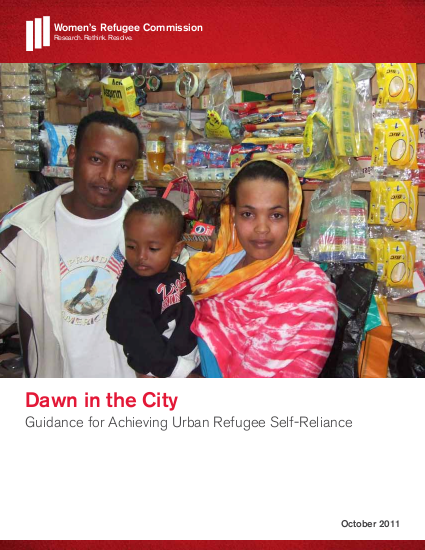
More than 50% of refugees live in urban areas.
Eighty percent are hosted by developing nations, in cities ill-equipped to guarantee their protection. The majority are marginalized due to their legal, economic and social status. They frequently lack sufficient legal and social support—education, health care, market access and community networks—to obtain gainful employment or run businesses. Refugees’ vulnerability to poverty is influenced by the policy environment, access to services, control of assets, choices of economic strategies and the capacity to cope with risks. They are not a homogenous group; their vulnerability and resilience varies. Refugees living in marginal areas, with few social networks and reliant on one source of income, have difficultly accessing food, jobs and physical security. Women and girls are particularly disadvantaged because of unequal access to resources, decision-making and negotiating power. Host governments’ policy and practice seldom view refugees as potential assets who can contribute to economic stimulation and growth—filling both skilled and unskilled labor shortages. Where policies do recognize refugees’ legal right to work, practice often results in exclusion and harassment. Regardless, urban refugees are economically active, predominately in the informal sector, remaining on the fringes of the economies in which they live. Many arrive with high levels of education, but barriers to market access means they often engage in unskilled or lowskilled work. It is important for all programs to expand refugees’ opportunities so that they can make choices about their well-being and resilience, regardless of whether they stay in their country of refuge, resettle, return home or move to another destination. Livelihood programs should connect refugees to services specific to their level of vulnerability and resilience. Refugees need a diverse set of interventions to enhance their well-being and “graduate” out of poverty.
Resource collections
- Accountability to affected populations (AAP)
- Topics
- UN Habitat - Urban Response Collection
- Urban Response - Urban Crisis Preparedness and Risk Reduction
- Urban Response Collection - Community Engagement and Social Cohesion
- Urban Response Collection - Economic Recovery
- Urban Response Collection - Environment and Climate Change
- Urban Response Collection - Housing, Land and Property
- Urban Response Collection - Urban Crisis Response, Recovery and Reconstruction
- Urban Response Collection - Urban Resilience
